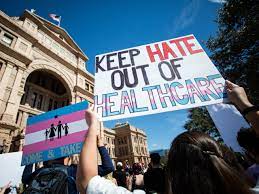The Restriction of Gender Affirming Care

April 14, 2023
The restriction of gender affirming care, particularly gender affirming care for youth who say they are transgender, is rapidly becoming more relevant within legislation and politics, including within Oklahoma legislation. Nine states have already passed restrictions on healthcare in addition to 83 bills that would put restrictions on healthcare are advancing in legislation, but what is the cause of this heightened concern, and more importantly, is it justified?
What Does Transgender Mean and What Is Gender-Affirming Care?
The Oxford English Dictionary defines transgender as denoting or relating to a person whose gender identity does not correspond with the sex registered for them at birth.
Gender affirming care includes a wide range of social, psychological, behavioral, and medical interventions designed to support and affirm an individual’s gender identity. These interventions can include counseling, medicine and surgery.
The main concern regarding gender affirming care is the permanency of some of the interventions, such as Gender reassignment surgery and Hormone Replacement Therapy, and the effect these interventions might have on individuals who receive it.
What Is Being Restricted?
Some popular restrictions that are affecting gender affirming care include the minimum ages allowed to receive gender affirming care and the source of funding for gender affirming care. In addition to these restrictions, there is also debate surrounding proposed punishments for those who provide gender affirming care. Some lawmakers across the country are advocating for a minimum age of 18, sometimes higher, in order to be eligible to receive any gender affirming care, in addition to preventing insurance from covering gender affirming care.
Many of those in support of restrictions to gender affirming care argue that decisions as impactful as transitioning should be made after the development of the brain, hence the age restrictions ranging from 18 to 26, as studies show that 25 is the age the brain finishes development. There are some that believe that gender affirming care should only happen after sufficient psychological counseling and others that extend upon this and believe that therapy should be encouraged as a replacement to gender affirming care.
Matt Sharp, a senior counsel for the conservative advocacy group Alliance Defending Freedom, said gender affirming care for adults is not something “we ought to be encouraging or supporting,” instead patients should be getting mental health treatments like “psychotherapy.”
Why is Gender Affirming Care Important?
It is entirely reasonable to place an age restriction on interventions that could permanently change a person, however, refusing to acknowledge the advice of professionals in the medical field is both dangerous and ignorant. The restrictions fail to consider that the process for eligibility have extensive and thorough procedures and rules before gender affirming care is administered to someone.
Data shows that 40% of transgender individuals have attempted suicide. Many healthcare institutions, such as the American Medical Association(AMA), are opposed to the restriction of gender affirming care because it “is medically-necessary, evidence-based care that improves the physical and mental health of transgender and gender-diverse people.” In addition to this, the AMA says they oppose “the dangerous intrusion of government into the practice of medicine and the criminalization of health care decision-making.”
Gender affirming care is an integral service in making sure that people who identify as transgender can live safely and securely in the US. Those who identify as transgender have a right to pursue their happiness and wellbeing, and it should be legislators’ job to ensure this right is protected.



































